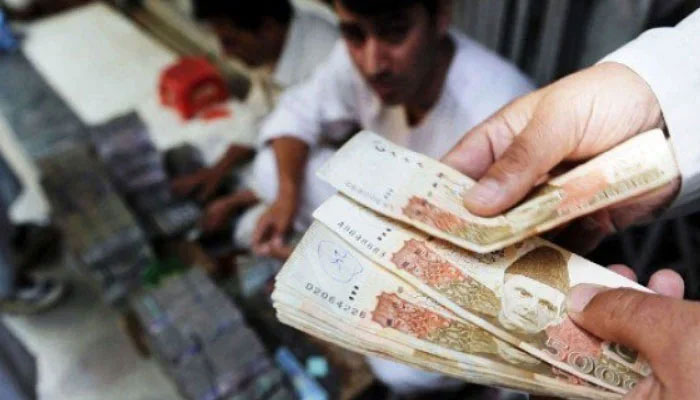Budget blues
LAHORE: The government is having a tough time in drafting a budget that not only fulfils IMF demands but also satisfies people, while simultaneously trying to convince traders and other groups to enter the tax net.
This is not the only problem that the government is facing; the IMF has also made its programme conditional upon the approval of the rollover of loans taken from friendly countries.
The rollover of loans from friendly Gulf countries was never a problem, but now the government finds it hard to convince China to reschedule loans under CPEC. In fact, the Chinese are demanding the immediate release of the overdue payments of Rs450 billion accrued under the power projects they commissioned and operated.
One of the purposes of Prime Minister Shehbaz Sharif’s recent China visit was to ask for this rescheduling, which has been granted but in return the Chinese have asked the government to start projects that were put on hold on the insistence of the IMF in the past. This includes the famous $6 billion railways upgrade project.
This time. the FBR has introduced a special scheme to collect Rs500 billion from traders. This is because previously when the FBR announced revenue targets based on tax proposals, it would miss the targets. Reasons would include the FBR’s lack of capability to collect the required taxes from traders and tax evaders. But the IMF is not buying this suggestion, and rightly so, because the registration under this scheme has been pathetically low, making it unlikely that the tax target from this scheme would be achieved.
This time, the IMF has given specific tax proposals to be incorporated in the next budget for collecting specific amounts from real estate, stock trading, and agriculture on the principle of equal tax. The government will have to toe the IMF line if it wants to secure a programme. In addition to this, it has asked to further increase the already high rates of general sales tax. Surprisingly, the government has shown no resistance to increasing GST as it is easy to implement.
Policymakers are however having nightmares about IMF insistence to increase the maximum tax rate on salaries to 45 per cent, while also increasing the existing rates on lower slabs. It is unfair to increase the tax rate on the most compliant sector in our tax regime. Almost 90 per cent of salaried people have no way to avoid or dilute their tax liability as other businesses usually do.
Another problem area is to collect tax from habitual industrial operators that pay nominal tax compared with their actual liabilities by under-filing their sales tax returns. At the top of this list is the tobacco sector, followed by sugar barons, cement manufacturers and beverage manufacturers.
While the technology (a trace and track system) is available in this regard, it has still not been used in these industries.
The FBR has proved through its three-decade-long performance about its incompetence to document tax evaders. Its reforms have failed time and again. Its incompetence brings blushes for the rulers.
-
 Prevent Cancer With These Simple Lifestyle Changes
Prevent Cancer With These Simple Lifestyle Changes -
 Experts Reveal Keto Diet As Key To Treating Depression
Experts Reveal Keto Diet As Key To Treating Depression -
 Inter Miami Vs Barcelona SC Recap As Messi Shines With Goal And Assist
Inter Miami Vs Barcelona SC Recap As Messi Shines With Goal And Assist -
 David Beckham Pays Tribute To Estranged Son Brooklyn Amid Ongoing Family Rift
David Beckham Pays Tribute To Estranged Son Brooklyn Amid Ongoing Family Rift -
 Jailton Almeida Speaks Out After UFC Controversy And Short Notice Fight Booking
Jailton Almeida Speaks Out After UFC Controversy And Short Notice Fight Booking -
 Extreme Cold Warning Issued As Blizzard Hits Southern Ontario Including Toronto
Extreme Cold Warning Issued As Blizzard Hits Southern Ontario Including Toronto -
 Lana Del Rey Announces New Single Co-written With Husband Jeremy Dufrene
Lana Del Rey Announces New Single Co-written With Husband Jeremy Dufrene -
 Ukraine-Russia Talks Heat Up As Zelenskyy Warns Of US Pressure Before Elections
Ukraine-Russia Talks Heat Up As Zelenskyy Warns Of US Pressure Before Elections -
 Lil Nas X Spotted Buying Used Refrigerator After Backlash Over Nude Public Meltdown
Lil Nas X Spotted Buying Used Refrigerator After Backlash Over Nude Public Meltdown -
 Caleb McLaughlin Shares His Resume For This Major Role
Caleb McLaughlin Shares His Resume For This Major Role -
 King Charles Carries With ‘dignity’ As Andrew Lets Down
King Charles Carries With ‘dignity’ As Andrew Lets Down -
 Brooklyn Beckham Covers Up More Tattoos Linked To His Family Amid Rift
Brooklyn Beckham Covers Up More Tattoos Linked To His Family Amid Rift -
 Shamed Andrew Agreed To ‘go Quietly’ If King Protects Daughters
Shamed Andrew Agreed To ‘go Quietly’ If King Protects Daughters -
 Candace Cameron Bure Says She’s Supporting Lori Loughlin After Separation From Mossimo Giannulli
Candace Cameron Bure Says She’s Supporting Lori Loughlin After Separation From Mossimo Giannulli -
 Princess Beatrice, Eugenie Are ‘not Innocent’ In Epstein Drama
Princess Beatrice, Eugenie Are ‘not Innocent’ In Epstein Drama -
 Reese Witherspoon Goes 'boss' Mode On 'Legally Blonde' Prequel
Reese Witherspoon Goes 'boss' Mode On 'Legally Blonde' Prequel




